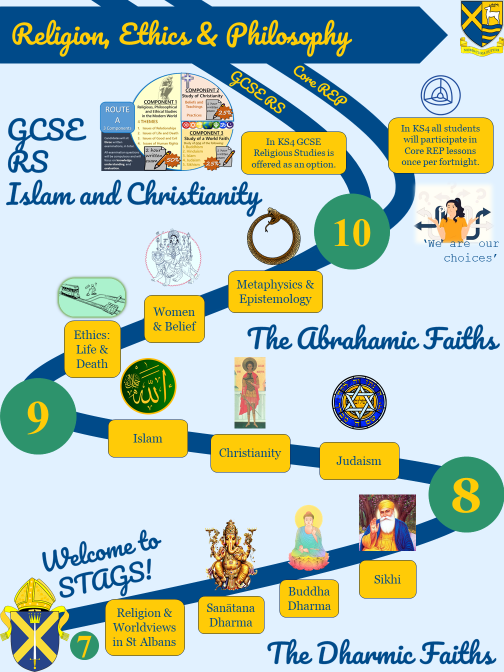- Home
- Learning
- Curriculum
- Religion, Ethics & Philosophy (REP)
- Key Stage 3 Core Religion, Ethics, Philosophy (REP)
Key Stage 3 Core Religion, Ethics, Philosophy (REP)
| Curriculum Intent and Overview |
|---|
|
Students will aim to acquire a level of 'religious literacy', which means they will be able to investigate belief systems through varied experiences, approaches and disciplines, reflect on and express their own ideas, and the ideas of others, with precision and clarity, and become increasingly able to respond to beliefs in an informed, rational and insightful way. Ofsted states that learning in REP should not be confused with "mere facts", and they speak of three 'pillars of progression'. Progression, therefore, involves securing increased knowledge in the following three categories: ‘Substantive knowledge’ about various religious and non-religious traditions, ‘ways of knowing’ or how to understand and investigate religious and non-religious beliefs, and ‘personal knowledge’ which is an awareness of one’s own presuppositions and values about belief systems. We will enable students to partake in informed discussion about complex beliefs systems. Students should be able to understand, and question, the accuracy of claims about different belief systems, regardless of whether they are themselves religious or not. |
|
|
The Department
We have sequenced the Schemes of Learning (SoL) in order to aid the acquisition of religious literacy, the understanding of ethical viewpoints, and the ability to practice philosophy. The ways of knowing and the students personal knowledge is explored throughout all topics. To make this as accessible as possible to students we have chosen to ensure the substantiative knowledge is structured in a way that aids students in seeing the synopticity within our three subjects, and the many topics contained within
KS3
What will be studied?
Year 7:
We first have an introduction to Religion, Ethics and Philosophy in St Albans, and how the subject will work at STAGS. We will spend the rest of year 7 studying the Dharmic faiths in chronological order.
Year 8:
In year 8 we study three of the Abrahamic faiths in chronological order, Judaism, Christianity and Islam. We use chronology to assist the students' understanding of the development and links within faiths.
Year 9:
In year 9 we will focus on ethics, including religious ethics, and an introduction to philosophy. This will aid students in discussing important topics in a nuanced and detailed manner. They will also be able to see if studying GCSE Religious Studies is something they are interested in. As many other subjects require ethics, this can also help students to develop an awareness of expectations when learning about medical ethics, business ethics, etc.
Choices moving forward: GCSE Religious Studies based on the most appropriate topics and board for our students. The GCSE features learning about 2 religions, selected on school demographics, with religious ethics and philosophy of religion. The chosen qualification, based on these criteria, is GCSE Religious Studies Eduqas Route A: Christianity and Islam.
At the end of Year 9 we aim for most students to be able to do the following:
- Use a range of increasingly complex religious, moral and philosophical vocabulary
- Demonstrate the ability to understand and explain a range of religious and non-religious worldviews, recognising their local, national and global context
- Use this knowledge to analyse and synthesise personal and critical responses to a range of different issues in order to form coherent, well-argued conclusions
- Challenge arguments about the meaning of religion and spirituality and suggest answers relating to the search for truth

What support is needed?
- Students will benefit from engaging in discussions at home, especially where they are questioned on the reasoning behind their beliefs.
- An awareness of current events, the impact their actions have on others and an awareness of the beliefs of those around them will help.
- Visiting sites of religious, ethical or philosophical interest.
- Watching or attending debates
How will students be assessed?
In order to make progress in REP, students add to their understanding as they extend their use of subject-specific vocabulary and encounter the same concepts in the contexts of different religions and worldviews. In particular, they learn at greater depth, which is reflected in 7 outcomes:
- Increasing the level of detail
- Moving from local to global contexts
- Making increasing links between smaller ideas
- Including exceptions and contrasts
- Moving from simple to complex and controversial ideas
- Understanding diversity in increasingly complex settings
- Recognising and handling an increasingly wide range of interpretations
At KS3 students will be assessed three times a year in a written format. This will aim to assess their ability to write an argument style answer to a topic. They will be expected to show key skills such as argument, analysis, evaluation, critique as well as being able to explain the views of more than one person or group. The use of examples will also help to show progress.
This will help their ability to answer essay based questions at KS4 in many subjects.